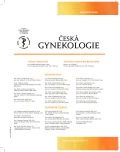Management of care of HIV-positive pregnant women in the period 1996–2014
Authors:
M. Mojhová 1
; I. Mikysková 1; M. Halaška 1; M. Staňková 2; H. Rozsypal 2; J. Šrámek 3; J. Záhumenský 4; M. Malý 5
Authors‘ workplace:
Gynekologicko-porodnická klinika 1. LF UK a Nemocnice Na Bulovce, Praha, přednosta prof. MUDr. M. Halaška, DrSc.
1; Klinika infekčních, parazitárních a tropických nemocí 1. LF UK, Praha, přednosta MUDr. H. Rozsypal, CSc.
2; Biofyzikální ústav LF Masarykovy univerzity, Brno, přednosta prof. RNDr. V. Mornstein, CSc.
3; Gynekologicko-porodnická klinika nemocnice, Trnava, přednosta doc. MUDr. J. Záhumenský, Ph. D.
4; Státní zdravotní ústav Praha, ředitel RNDr. V. Němeček, CSc.
5
Published in:
Ceska Gynekol 2016; 81(3): 177-181
Overview
Objective:
The evaluation of multidisplinary care about HIV positive pregnant women in the Czech Republic.
Design:
Review.
Settings:
Gynekologicko-porodnická klinika 1. LF UK a Nemocnice na Bulovce, Praha.
Methods:
The vertical transmission of HIV infection from mother to fetus occurs most often during birth, still 1–2% of HIV-positive pregnant women will transfer the virus transplacenta. Due to careful screening for HIV during pregnancy, counselling, combination antiretroviral (cART) therapy, childbirth planning and its performance by C-section there appears a significant decrease of the virus transmission to the fetus, its occurrence is around 2%. If the HIV infection is detected in the context of screening for sexually transmitted infections (STIs), we begin with combined antiretroviral therapy (cART) depending on the level of viremia and CD4 as soon as possible. All HIV-positive pregnancies are tested for possible coinfection with hepatitis C. Since the first application of the antiretroviral treatment, the therapy is applies throughout the duration of the pregnancy. The labours of the HIV- positive women in the Czech Republic are scheduled. The primary choice is a caesarean section during the 38th week of pregnancy.
Conclusion:
From 1996–2014 the HIV positive status at 18 months of child age was confirmed in 4 cases in the Czech Republic. Three children were born to mothers whose HIV status was unknown at the time of the birth. Thanks to strict adherence to the interdisciplinary care, HIV positive woman have a chance to deliver a HIV-negative newborn and the risk of the transmission of the virus is significantly low.
Keywords:
vertical transmission, transplacental transmission, STI screening, cART, cesarean section, prophylactic cART therapy of newborn
Sources
1. Bartůňková, J. Imunodeficience. Praha: Grada Publishing, 2002, 232 s.
2. Carceller, A., Ferreira, E., Alloul, S., Lapointe, N. Lack of effect on prematurity, birth weight, and infant growth from exposure to protease inhibitors in utero and after birth. Pharmacotherapy, 2009, 11, p. 1289–1296.
3. Cooper, ER., Charurat, M., Mofenson, L., et al. Combination antiretroviral strategies for the treatment of pregnant HIV-1-infected women and prevention of perinatal HIV-1 transmission. J Acquir Immune Defic Syndr, 2002, 29, 5, p. 484–494.
4. Ekouevi, DK., Inwoley, A., Tonwe-Gold, B., et al. Variation of CD4 count and percentage during pregnancy and after delivery: implications for HAART initiation in resource-limited settings. AIDS Res Hum Retroviruses, 2007, 23, 12, p. 1469–1474.
5. European Collaborative Study. Mother-to-child transmission of HIV infection in the era of highly active antiretroviral therapy. Clin Infect Dis, 2005, 40, 3, p. 458–465.
6. Garcia, PM., Kalish, LA., Pitt, J., et al. Maternal levels of plasma human immunodeficiency virus type 1 RNA and the risk of perinatal transmission. Women and Infants Transmission Study Group. N Engl J Med, 1999, 341, 6, p. 394–402.
7. Gisslen, M., Alqvist-Rastad, J., Albert, J., et al. Antiretroviral treatment of HIV infection: Swedish recommendations 2005. Scand J Infect Dis, 2006, 38, 2, p. 86–103.
8. Floridia, M., Ravizza, M., Pinnetti, C., et al. Treatment change in pregnancy is a significant risk factor for detectable HIV-1 RNA in plasma at end of pregnancy. HIV Clin Trials, 2010, 11, 6, p. 303–311.
9. Guidelines for the use of antiretroviral agents in HIV-1 infected adults and adolescents. Available on http://aidsinfo.nih.gov/guidelines.
10. Ioannidis, JP., Abrams, EJ., Ammann, A., et al. Perinatal transmission of human immunodeficiency virus type 1 by pregnant women with RNA virus loads < 1000 copies/ml. J Infect Dis, 2001, 183, 4, p. 539–545.
11. Jilich, D., Machala, L., Rozsypal, H., et al. Návrh doporučeného postupu očkování u dospělých osob infikovaných virem HIV-1. Klin mikrobiol inf Lék, 2008, 14, 2, s. 59–64.
12. Moodley, D., Moodley, J., Coovadia, H., et al. A multicenter randomized controlled trial of nevirapine versus a combination of zidovudine and lamivudine to reduce intrapartum and early postpartum mother-to-child transmission of human immunodeficiency virus type 1. J Infect Dis, 2003, 187, 5, p. 725–735.
13. Nielsen-Saines, K., Watts, DH., Veloso, VG., et al. Three postpartum antiretroviral regimens to prevent intrapartum HIV infection. N Engl J Med, 2012, 366, 25, p. 2368–2379.
14. Petra Study Team. Efficacy of three short-course regimens of zidovudine and lamivudine in preventing early and late transmission of HIV-1 from mother to child in Tanzania, South Africa, and Uganda (Petra study): a randomised, double-blind, placebo-controlled trial. Lancet, 2002, 359, 9313, p. 1178–1186.
15. Sedláček, D., Staňková, M., Machala, L., et al. Komplexní postup antiretrovirové léčby osob infikovaných virem lidské imunodeficience (HIV) v České republice. Klin mikrobiol inf Lék, 2007, 13, 1, s. 28–34.
16. www.szu.cz, Státní zdravotní ústav, Národní referenční laboratoř pro HIV/AIDS, RNDr. Vratislav Němeček, CSc.
Labels
Paediatric gynaecology Gynaecology and obstetrics Reproduction medicineArticle was published in
Czech Gynaecology

2016 Issue 3
Most read in this issue
- Traumatic symphyseal rupture by vaginal delivery,report of a rare case
- The possibility of antepartal prevention of episiotomy and perineal tears during delivery
- Spontaneus delivery after two previous caesarean sections – case report
- Surgical treatment of endometriomas and ovarian reserve
